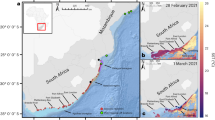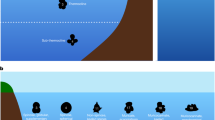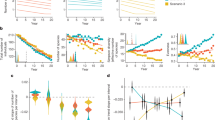Abstract
PREDATION is widespread in the pelagic zone of lakes and both vertebrate and invertebrate predators are abundant and diverse in their feeding habits. Vertebrate predators are often size-selective and can virtually eliminate larger prey items1–3. These dramatic effects resulting from fish predation have led several workers to conclude that vertebrates contribute the largest percentage of the total predation intensity on freshwater zooplankton. Particular invertebrate predators, however, have also been shown to crop a substantial proportion of their prey populations4–6. I report here a study showing that invertebrate predation is more intense than vertebrate predation in the pelagic zone of Gull Lake, Michigan, with the first in situ evaluation of both types of predation on a single zooplankton prey assemblage. The significance of identifying major predation pathways in lakes is basic to many contemporary discussions of nutrient and energy flow as well as considerations of community structure and stability.
This is a preview of subscription content, access via your institution
Access options
Subscribe to this journal
Receive 51 print issues and online access
$199.00 per year
only $3.90 per issue
Buy this article
- Purchase on Springer Link
- Instant access to full article PDF
Prices may be subject to local taxes which are calculated during checkout
Similar content being viewed by others
References
Brooks, J. L. & Dodson, S. L. Science 150, 28–35 (1965).
Northcote, T. G. & Clarotto, R. Verh. Int. Verein. Limnol. 19, 2378–2393 (1975).
Hutchinson, B. P. Trans. Am. Fish. Soc. 100, 325–335 (1971).
Federenko, A. Limnol. Oceanogr. 20, 250–258 (1975).
Confer, J. L. Limnol. Oceanogr. 16, 663–667 (1971).
McQueen, D. J. J. Fish. Res. Bd Can. 26, 1605–1618 (1969).
Lane, P. A. Ecol. Monogr. 45, 307–337 (1975).
Lane, P. A., Lauff, G. H. & Levins, R. Soc. Indust. appl. Math. Symp. 1, 111–130 (1975).
Moss, B. Freshwat. Biol. 1, 309–320 (1972).
Burbidge, R. Trans. Am. Fish. Soc. 98, 631–640 (1969).
Ovink, R. M.Sc. thesis, Michigan State Univ. (1978).
Noble, R. L. Prog. Fish Cult. 34, 191–194 (1972).
Lane, P. A. Verh. Int. Verein. Limnol. 20, 480–485 (1979).
Lane, P. A., Klug, M. J. & Louden, L. Trans. Am. microsc. Soc. 95, 143–155 (1976).
Hall, D. J., Threlkeld, S. T., Burns, C. W. & Crowley, P. H. A. Rev. ecol. Syst. 7, 177–208 (1976).
Northcote, T. G., Walters, C.J. & Hume, J.M.B. Verh. Int. Verein. Limnol. 20 (in the press).
Author information
Authors and Affiliations
Rights and permissions
About this article
Cite this article
LANE, P. Vertebrate and invertebrate predation intensity on freshwater zooplankton communities. Nature 280, 391–393 (1979). https://doi.org/10.1038/280391a0
Received:
Accepted:
Published:
Issue Date:
DOI: https://doi.org/10.1038/280391a0
This article is cited by
-
Composition and distribution pattern of plankton communities in lagoon and offshore region of Kavaratti Atoll, Lakshadweep Archipelago, India
Sustainable Water Resources Management (2021)
-
Body size in freshwater planktonic crustaceans: an overview of extrinsic determinants and modifying influences of biotic interactions
Hydrobiologia (2011)
-
Diel vertical migrations of invertebrate predators (Leptodora kindtii ,Thermocyclops taihokuensis, andMesocyclops sp .) in a shallow, eutrophic lake
Hydrobiologia (2004)
-
Food-web studies in shallow eutrophic lakes by the Netherlands Institute of Ecology: Main results, knowledge gaps and new perspectives
Netherlands Journal of Aquatic Ecology (1993)
-
Impact of whitefish on an enclosure ecosystem in a shallow eutrophic lake: selective feeding of fish and predation effects on the zooplankton communities
Hydrobiologia (1990)
Comments
By submitting a comment you agree to abide by our Terms and Community Guidelines. If you find something abusive or that does not comply with our terms or guidelines please flag it as inappropriate.



